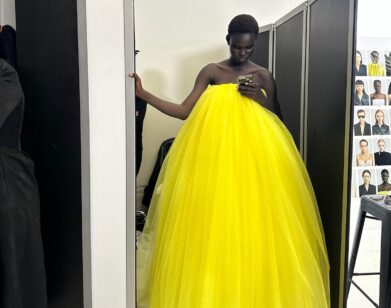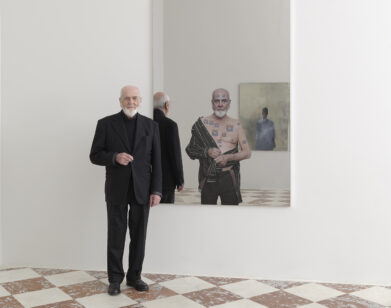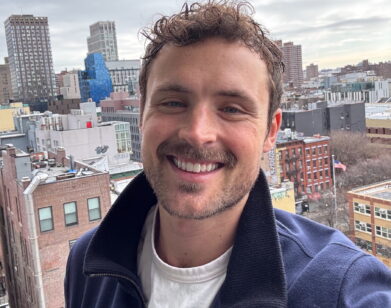Kathleen Alcott’s Alphabet City

IMAGE COURTESY OF PETER DOBEY
What happens when you dream? In her debut novel The Dangers of Proximal Alphabets (Other Press), Kathleen Alcott lures us into the lives of Ida, Jackson, and James: a motherless girl who becomes best friends with the boy down the street and his younger brother. They grow. They kiss. They fight. They fall. Through it all, Ida is wide-awake each night as Jackson does extraordinary things in his sleep—things that destroy and amaze.
We chatted with Alcott about the nature of art, a history of words, and the best sleep-talkers we know.
JENNIFER SKY: What has your personal relationship been with words?
KATHLEEN ALCOTT: I remember being very young and at first feeling fascinated with the vast scope of available words—how could there be so many, how could each be so precise—and then feeling further electrified when I saw them as materials for construction. My parents both worked long hours; when they got home, as often as they read me stories, we created them together. My father would offer a sentence, and I would follow it, and we would go like that in a cycle. Later in life, my dad got sick, and it was around then he started making me flashcards from words in the dictionary. He was incredibly sad he wouldn’t be there to see me, for example, go to college or raise a son, and it was like he wanted to make sure I had the words to describe and explain these things. I remember thinking it sort of burdensome, at 13 and 14, coming home and seeing the new stack of index cards, but now I see it as the most flexible inheritance he could think to leave me.
SKY: The father and daughter’s relationship in your book is one of my favorites. What part, if any, did your own father’s memory play in shaping this relationship?
ALCOTT: The relationship between Ida and William is rather divergent from the one I had with my father, but I did imbue William with some of his lovelier traits. The fact of the matter is, though, that he died when I was almost 16, which is to say before I was really circling adulthood—so it was a bit of a sad exercise to create the relationship an adult woman has with her father, because I can only imagine. The only truly direct transposition was illness, what it means to watch your parent’s body fail.
SKY: Do you find you most often write from a place of experience or make-believe?
ALCOTT: I’m not sure I could manage one without the other. I’ve never prodded anyone into creating art in their sleep, for instance, but that aspect of the book still felt like it came from experience because the feelings involved—of trying to smother some hurtful aspect of someone with a loving re-imagination of it, of watching your attempts to blind yourself from a hard truth —are familiar. In the book I’m working on now, there’s a stroke victim; while I’ve never dealt with that personally, it’s not hard for me to access the emotional state that would come along with it. If I wanted to write nonfiction, then I would, but I like to think the writer’s job is to travel beyond their experiential circumscriptions, and that by doing so, I can play in the ontological more effectively. This sounds a little depressing. I also write stories just to make myself laugh.
SKY: Illness and addiction are both themes in The Dangers of Proximal Alphabets. What kind of research did you do?
ALCOTT: For Alphabets, I did sort of a strange smattering of research. I spent time a little with these 1890s texts about sleepwalking and a few clinical studies and news articles, and talked to people who sleepwalked, but in the end I was lucky, because somnambulism lends itself to so many potential outcomes. I think what is important in research is to first understand what definitely is not possible, establish limits, and then play within that. In terms of mental illness, which is sort of the parallel “sickness” in Alphabets… I’ve been, am close to someone mentally ill. I think it’s common that, as someone who loves them, you want to understand from a clinical perspective, sort of map out the awful mystery with thumbtacks, so I’d already pursued some research there and went further. As for addiction… I’ll just say there was a point in my life where enough of my friends were into speed or opiates—I was lucky enough never to fall into it—that it stuck on my heart.
SKY: Have you had experience with night spells?
ALCOTT: I’m not a sleepwalker, but I talk quite a bit. Reactions from ex-boyfriends have ranged widely on a spectrum of “That’s so sweet,” to “Can you please keep it down?,” to “What the fuck is wrong with you?” Sometimes I ask benign questions like “Can I have a Coca-Cola?,” but on other occasions what comes out is really bizarre or indignant and I sort of thrash around. I’ve always been fascinated to hear what I’ve been up to while sleeping.
SKY: Last year my boyfriend woke me up speaking Old English in his sleep. He was reciting Beowulf and something about knives and babies. I recorded it. It is truly creepy, the things we unconsciously hold onto and can unleash in the night.
ALCOTT: God, that’s amazing. I would love to hear that. My greatest hits include “‘Cheaters’ is my password,” “I can’t believe you kissed her. That is Danny DeVito’s wife,” and “Happy birthday, sweetheart. We are so glad you’re here.”
SKY: In this book, you re-mold the idea of the nuclear family. Can we choose our family?
ALCOTT: I think it’s a dangerous territory, the choosing-your-own-family conundrum. I think you can if you approach it understanding that any system of people grows with its own set of complications, but probably too often there’s a false dichotomy in place that says, “My blood family is wholly hurtful and bad for X, Y, Z [reasons] and my chosen family is perfect and good for X, Y, Z.” Neither is true.
SKY: Is art unconscious?
ALCOTT: I think we’re always working out little problems in our bones, yeah. That’s not to say I just sort of cough up some words and then there’s art—I’m intentional and watchful—but it has happened where I’ll finish something, whether it’s a paragraph or story, and look up amazed because I didn’t know I cared so much about a particular issue. I’m not sure about other kinds of artists. Writing its pretty perverse in that basically you open some wound and then once the blood’s out there mingling with oxygen you dab up the excess to follow a shape.
THE DANGERS OF PROXIMAL ALPHABETS IS OUT TODAY.






